#addition student unions
Text
i wish there were like 40 hours in a day or something I am not sure how long I can keep up with this
#good news: i have been doing well in outreaching to local orgs to collab w my school's asian student union :) we have a lotta ideas#additional good news: i have been chosen to help lead this like idk medical zoom club?? that works w Maine kids and tufts med students#bad news: i am going crazzzzzy and I have SO MUCH WORK and I am SO STRESSED ABT IT
4 notes
·
View notes
Text
"For the first time in almost 60 years, a state has formally overturned a so-called “right to work” law, clearing the way for workers to organize new union locals, collectively bargain, and make their voices heard at election time.
This week, Michigan finalized the process of eliminating a decade-old “right to work” law, which began with the shift in control of the state legislature from anti-union Republicans to pro-union Democrats following the 2022 election. “This moment has been decades in the making,” declared Michigan AFL-CIO President Ron Bieber. “By standing up and taking their power back, at the ballot box and in the workplace, workers have made it clear Michigan is and always will be the beating heart of the modern American labor movement.”
[Note: The article doesn't actually explain it, so anyway, "right to work" laws are powerful and deceptively named pieces of anti-union legislation. What right to work laws do is ban "union shops," or companies where every worker that benefits from a union is required to pay dues to the union. Right-to-work laws really undermine the leverage and especially the funding of unions, by letting non-union members receive most of the benefits of a union without helping sustain them. Sources: x, x, x, x]
In addition to formally scrapping the anti-labor law on Tuesday [February 13, 2024], Michigan also restored prevailing-wage protections for construction workers, expanded collective bargaining rights for public school employees, and restored organizing rights for graduate student research assistants at the state’s public colleges and universities. But even amid all of these wins for labor, it was the overturning of the “right to work” law that caught the attention of unions nationwide...
Now, the tide has begun to turn—beginning in a state with a rich labor history. And that’s got the attention of union activists and working-class people nationwide...
At a time when the labor movement is showing renewed vigor—and notching a string of high-profile victories, including last year’s successful strike by the United Auto Workers union against the Big Three carmakers, the historic UPS contract victory by the Teamsters, the SAG-AFTRA strike win in a struggle over abuses of AI technology in particular and the future of work in general, and the explosion of grassroots union organizing at workplaces across the country—the overturning of Michigan’s “right to work” law and the implementation of a sweeping pro-union agenda provides tangible evidence of how much has changed in recent years for workers and their unions...
By the mid-2010s, 27 states had “right to work” laws on the books.
But then, as a new generation of workers embraced “Fight for 15” organizing to raise wages, and campaigns to sign up workers at Starbucks and Amazon began to take off, the corporate-sponsored crusade to enact “right to work” measures stalled. New Hampshire’s legislature blocked a proposed “right to work” law in 2017 (and again in 2021), despite the fact that the measure was promoted by Republican Governor Chris Sununu. And in 2018, Missouri voters rejected a “right to work” referendum by a 67-33 margin.
Preventing anti-union legislation from being enacted and implemented is one thing, however. Actually overturning an existing law is something else altogether.
But that’s what happened in Michigan after 2022 voting saw the reelection of Governor Gretchen Whitmer, a labor ally, and—thanks to the overturning of gerrymandered legislative district maps that had favored the GOP—the election of Democratic majorities in the state House and state Senate. For the first time in four decades, the Democrats controlled all the major levers of power in Michigan, and they used them to implement a sweeping pro-labor agenda. That was a significant shift for Michigan, to be sure. But it was also an indication of what could be done in other states across the Great Lakes region, and nationwide.
“Michigan Democrats took full control of the state government for the first time in 40 years. They used that power to repeal the state’s ‘right to work’ law,” explained a delighted former US secretary of labor Robert Reich, who added, “This is why we have to show up for our state and local elections.”"
-via The Nation, February 16, 2024
#michigan#united states#us politics#labor#labor rights#labor unions#capitalism#unions#unionize#gretchen whitmer#democrats#voting matters#right to work#pro union#workers#workers rights#good news#hope
1K notes
·
View notes
Note
Do the batfamily members ever get too into their undercover work? (Undercover in an office and theyre worried about spreadsheets, working in a warehouse and coming home complaining about missing parts)
Bruce: Status updates on your undercover missions. Dick, you first. What have you got down at the docks?
Dick: I haven't confirmed the Killer Croc sightings yet, but more importantly, our catch hasn't been measuring up to last year's. Tuna we're doing okay on, but the salmon population seems to be on the low end. I've contacted the Department of Wildlife and Fisheries but it'll be another 3-5 business days before they can come down and check it out.
Bruce: At least you're doing something to help. Jason?
Jason: Class was okay. I think the kids are warming up to me as their substitute while Mrs. Maloney is out on maternity leave. The average on the last vocabulary quiz was 83.53% so either I'm doing my job right or they need to be challenged. I'm worried about Tristan Lancy, though. He's normally a good student but his grades have been dropping recently and his parents don't seem like safe people to tell. I'll talk to him tomorrow and try to pair him up with a peer tutor if he needs it.
Bruce: Also see if he has any alternate contacts besides his parents. Tim, any updates at the chemical plant?
Tim: If by updates you mean OSHA violations, I could go on all week. We got a batch of new recruits today and they were just thrown into the work—no PPE, no safety training, nothing. This is what happens when you place production over employee well-being. I'm gonna file a complaint after this meeting. Also, I think the union will have something to say about the manager cutting people's lunch breaks short.
Bruce: I see. Damian? Please tell me you found something volunteering at the zoo.
Damian: Depends on how you define "found." While I have not obtained evidence of a mutant larvae black market, I did help some of the animals at the sanctuary make progress with their recovery. Bobo the monkey is healing from his broken arms and we're gradually getting him re-acclimated to climbing higher surfaces. Suzie the black bear was born a little prematurely but seems to be catching up to her peers in terms of growth. Lastly, we got a grant for additional wildcat research and enrichment. As an aside, we are having an educational seminar on European mountain goats this Friday at 3:30 and I expect all of you to be there.
Bruce: I'll put that on our calendars. Steph?
Steph: It's not really undercover work for me, just work. Anyway, yes the newest Batburger location is being used for money laundering. But I really need to vent about the customers for a sec. We don't open until 10 and at 9:30 this morning some moron was banging on our door demanding Jokerized cheese fries. Then right in the middle of the lunch rush, Janie got sick so I had to fill in as the cashier and it was hell. After that, I had to step in between a fight at the drive-thru because the customer claimed we only gave him nine pieces of his ten-piece Robin nuggets and tried to beat up the kid who took his order. And to top it all off, an entire high school hockey team came in five minutes before closing.
Bruce: Cass?
Cass, blowing balloons: Can't talk. Arranging bat mitzvah.
Bruce: Duke, you're my last hope.
Duke: Margie's bringing a peanut butter chocolate cake to the bake sale. I swiped her recipe and we can easily beat her. Her ganache is way too watery and just runs off the top of the cake, which isn't even leveled. She's also trying to do something with a raspberry filling that isn't working at all. It's like she couldn't decide on what to bring. The bake sale committee also asked if we can bring some apple pies because the original baker has to go out of town for a family emergency. I think we'll win if we bring them with some ice cream and a touch of caramel, even though this isn't a contest.
Bruce: Thank you. At least our most critical case has been taken care of.
Barbara: ...I'll save my book launch for later.
#bruce wayne#batman#dick grayson#nightwing#jason todd#red hood#tim drake#red robin#damian wayne#robin#duke thomas#signal#stephanie brown#spoiler#cassandra cain#orphan#barbara gordon#oracle#batfamily#batfam#batboys#batbros#batgirls#batkids#batsiblings#batman family#incorrect batfamily quotes#incorrect quotes#incorrect dc quotes#dc comics
1K notes
·
View notes
Text
Best News of Last Week - December 11
1. Biden administration to forgive $4.8 billion in student loan debt for 80,300 borrowers
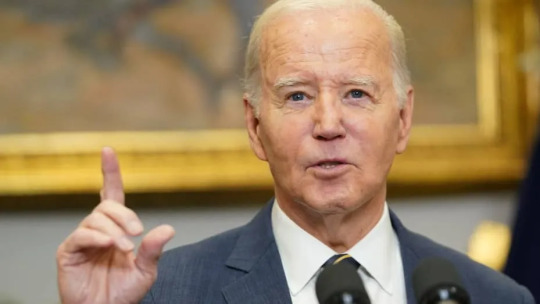
The Biden administration announced on Wednesday that it would forgive an additional $4.8 billion in student loan debt, for 80,300 borrowers.
The relief is a result of the U.S. Department of Education’s fixes to its income-driven repayment plans and Public Service Loan Forgiveness program.
2. Detroit on pace to have lowest homicide rate in 60 years this year
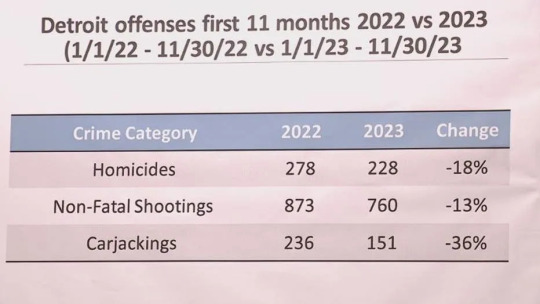
A partnership to reduce Detroit crime is being praised with the City on pace for the fewest homicides in 60 years.
"This is the day we’ve been waiting for, for a long time," said Mayor Mike Duggan. The coalition which includes city and county leaders that Detroit Police Chief James White formed in late 2021 to return the criminal justice system in Detroit and Wayne County to pre-Covid operations.
3. Dog that killed 8 coyotes to protect sheep running for Farm Dog of the Year

Over a year ago, Casper was stacked up against a pack of 11 coyotes, and he overcame them all to protect the livestock at his Decatur home. Now he needs your help.
Casper, the Great Pyrenees livestock guardian dog, needs the public to vote for him to become the American Farm Bureau's "Farm Dog of the Year: People's Choice Pup" contest.
4. Shimmering golden mole thought extinct photographed and filmed over 80 years after last sighting

De Winton's golden mole, last sighted in 1937, has been found alive swimming through sand dunes in South Africa after an extensive search for the elusive species.
5. About 40% of the world's power generation is now renewable

The International Renewable Energy Agency (IRENA) and World Meteorological Organization (WMO) have released their first joint report to strengthen understanding of renewable energy resources and their intricate relationship with climate variability and change.
In 2022 alone, 83% of new capacity was renewable, with solar and wind accounting for most additions. Today, some 40% of power generation globally is renewable, due to rapid deployment in the past decade, according to the report.
6. Jonathan the Tortoise: World’s oldest living land animal celebrates 191st birthday

The world’s oldest living land animal - a Seychelles giant tortoise named Jonathan - has just celebrated his 191st birthday. Jonathan’s estimated 1832 birth year predates the invention of the postal stamp, the telephone, and the photograph.
The iconic creature lived through the US civil war, most of the reign of Queen Victoria, the rise and fall of the Soviet Union, and two world wars.
7. New enzyme allows CRISPR technologies to accurately target almost all human genes

A team of engineers at Duke University have developed a method to broaden the reach of CRISPR technologies. While the original CRISPR system could only target 12.5% of the human genome, the new method expands access to nearly every gene to potentially target and treat a broader range of diseases through genome engineering.
---
That's it for this week :)
This newsletter will always be free. If you liked this post you can support me with a small kofi donation here:
Buy me a coffee ❤️
Also don’t forget to reblog this post with your friends.
906 notes
·
View notes
Text
Things Biden and the Democrats did, this week #10
March 15-22 2024
The EPA announced new emission standards with the goal of having more than half of new cars and light trucks sold in the US be low/zero emission by 2032. One of the most significant climate regulations in the nation’s history, it'll eliminate 7 billion tons of CO2 emissions over the next 30 years. It's part of President Biden's goal to cut greenhouse gas emissions in half by 2030 on the road to eliminating them totally by 2050.
President Biden canceled nearly 6 Billion dollars in student loan debt. 78,000 borrowers who work in public sector jobs, teachers, nurses, social workers, firefighters etc will have their debt totally forgiven. An additional 380,000 public service workers will be informed that they qualify to have their loans forgiven over the next 2 years. The Biden Administration has now forgiven $143.6 Billion in student loan debt for 4 million Americans since the Supreme Court struck down the original student loan forgiveness plan last year.
Under Pressure from the administration and Democrats in Congress Drugmaker AstraZeneca caps the price of its inhalers at $35. AstraZeneca joins rival Boehringer Ingelheim in capping the price of inhalers at $35, the price the Biden Admin capped the price of insulin for seniors. The move comes as the Federal Trade Commission challenges AstraZeneca’s patents, and Senator Bernie Sanders in his role as Democratic chair of the Senate Health Committee investigates drug pricing.
The Department of Justice sued Apple for being an illegal monopoly in smartphones. The DoJ is joined by 16 state attorneys general. The DoJ accuses Apple of illegally stifling competition with how its apps work and seeking to undermining technologies that compete with its own apps.
The EPA passed a rule banning the final type of asbestos still used in the United States. The banning of chrysotile asbestos (known as white asbestos) marks the first time since 1989 the EPA taken action on asbestos, when it passed a partial ban. 40,000 deaths a year in the US are linked to asbestos
President Biden announced $8.5 billion to help build advanced computer chips in America. Currently America only manufactures 10% of the world's chips and none of the most advanced next generation of chips. The deal with Intel will open 4 factories across 4 states (Arizona, Ohio, New Mexico, and Oregon) and create 30,000 new jobs. The Administration hopes that by 2030 America will make 20% of the world's leading-edge chips.
President Biden signed an Executive Order prioritizing research into women's health. The order will direct $200 million into women's health across the government including comprehensive studies of menopause health by the Department of Defense and new outreach by the Indian Health Service to better meet the needs of American Indian and Alaska Native Women. This comes on top of $100 million secured by First Lady Jill Biden from ARPA-H.
Democratic Senators Bob Casey, Tammy Baldwin, Sherrod Brown, and Jacky Rosen (all up for re-election) along with Elizabeth Warren, Cory Booker, and Sheldon Whitehouse, introduced the "Shrinkflation Prevention Act" The Bill seeks to stop the practice of companies charging the same amount for products that have been subtly shrunk so consumers pay more for less.
The Department of Transportation will invest $45 million in projects that improve Bicyclist and Pedestrian Connectivity and Safety
The EPA will spend $77 Million to put 180 electric school buses onto the streets of New York City This is part of New York's goal to transition its whole school bus fleet to electric by 2035.
The Senate confirmed President Biden's nomination of Nicole Berner to the Court of Appeals for the Fourth Circuit. Berner has served as the general counsel for America's largest union, SEIU, since 2017 and worked in their legal department since 2006. On behalf of SEIU she's worked on cases supporting the Affordable Care Act, DACA, and against the Defense of Marriage act and was part of the Fight for 15. Before working at SEIU she was a staff attorney at Planned Parenthood. Berner's name was listed by the liberal group Demand Justice as someone they'd like to see on the Supreme Court. Berner becomes one of just 5 LGBT federal appeals court judges, 3 appointed by Biden. The Senate also confirmed Edward Kiel and Eumi Lee to be district judges in New Jersey and Northern California respectively, bring the number of federal judges appointed by Biden to 188.
#Thanks Biden#Joe Biden#Democrats#politics#US politics#climate change#climate crisis#student loans#debt forgiveness#shrinkflation#women's health#drug prices
451 notes
·
View notes
Text
Music colleges and conservatoires are deterring women and girls from playing “masculine instruments” such as drums and trumpets, a parliamentary report laying bare sexism in the music industry has revealed.
Female students are “cat-called in rehearsals”, held to a higher standard with “masculine” instruments and being told they cannot play properly if “they didn’t sit with their legs open”, the report states.
The Misogyny in Music report by parliament’s women and equalities committee found female musicians faced “endemic” discrimination in the industry which they described as a “boys’ club where sexual harassment and abuse is common”.
A series of female musicians and DJs including Annie Macmanus, Rebecca Ferguson and Katie Waissel gave evidence to the committee about discrimination and abuse they had witnessed or experienced.
Waissel, the former X Factor contestant, told the inquiry how “at the age of 16, she was grabbed by a much older man and placed on his lap in the recording studio while they were reviewing the track she was recording”.
The report found that many female performers who had been the victims of “discrimination, harassment and abuse” continued to be silenced through the widespread use of non-disclosure agreements (NDAs).
It said: “Women in the music industry have had their lives ruined and their careers destroyed by men who have never faced the consequences for their actions.
“People in the industry who attend award shows and parties currently do so sitting alongside sexual abusers who remain protected by the system and by colleagues.”
The report went on: “Much of the evidence we received has had to remain confidential, including commentary on television shows and household names.
“That is highly regrettable but demonstrates the extent of the use of NDAs and the culture of silence.”
The report outlined gender disparities throughout the industry. For example, less than 5 per cent of the producers or engineers on the top streamed tracks in 14 genres were female or non-binary, while of all the songwriters and composers who received a royalty in 2020, only one in six were female.
It also pointed out that the record label departments charged with finding new talent were dominated by men, concluding: “Women have significant additional barriers to pass to get a foothold in the music industry and must navigate acts of passive aggression, ridicule and misogyny to have a sustainable career.
“Female artists are routinely undervalued and undermined, endure a focus on their physical appearance in a way that men are not subjected to, and have to work far harder to get the recognition their ability merits. Despite increases in representation, discrimination and misogyny remain endemic.”
The committee also called for music colleges, conservatoires and other educational establishment “to do more to address the gendering of instruments, roles and genres.”
Its members heard that “in many cases women are discouraged from playing certain instruments at all’, with one witness saying: “There is this idea that if you’re a girl you can’t play the drums, or if you’re a girl you can’t play the trumpet really loudly because it will make you look ugly.”
The report said that the Musicians’ Union had described female students being “cat-called in rehearsals”, “made to feel uncomfortable by male lecturers” and being told “they couldn’t play their instrument properly if they didn’t sit with their legs open in orchestra rehearsals”.
Caroline Nokes, the Conservative MP who chairs the committee, said “endemic misogyny … has persisted for far too long within the music industry.”
She added: “A shift in the behaviour of men — and it is almost always men — at the heart of the music industry is the transformative change needed for talented women to quite literally have their voices heard and be both recognised and rewarded on equal terms.”
361 notes
·
View notes
Text
After a historic 6 week strike, the Temple University Graduate Students Association - the first graduate worker union in Pennsylvania - has WON.
When we went out on January 31st, I don’t think any of us thought that we would end up here. This was a long and arduous process that could never have been accomplished without everyone involved—and I do mean everyone.
Numerous news outlets have been reporting throughout the whole strike, but I’d like to run through what, exactly, it is we’ve done.
After well over a year of negotiations (we went to the table in January of 2022 after the administration delayed responding to our RFIs for months) and more than a year without a contract (it expired on February 15, 2022), we were stuck with an administrative team whose position was, resolutely, “we are happy with the contract as it is.” Their belief was that teaching and research assistants, who facilitate—at a conservative estimate—approximately one-third of all instructional work here on campus were “not a core function of the university.” Pay was structured around a tier-based system that generated inequity as part of its structure which ultimately manifested as race and gender based wage gaps, and that pay averaged out between 19k and 20k for the majority of our bargaining unit. We had only five days of parental leave in the event of childbirth. To cover a single dependent on the dependent healthcare plan required an individual to spend approximately 30% of their paycheck. There had been no substantive raises or adjustments for the cost of living since our first contract as a union.
During the strike, Temple university cut our healthcare and revoked tuition remission, attempting to break us through punitive bills and threats. They quite literally threatened peoples’ lives in addition to their livelihoods. International students were threatened for daring to exercise the rights they have as visa holders to engage in protected concerted activity. They attempted to break our will and our organization.
They failed. We didn’t.
On Monday, voting on a second tentative agreement closed. The contract negotiations team and the executive board unanimously endorsed that TA. It passed at an overwhelming 98% vote among our members. That TA, which will now become our contract, did the following:
Eliminated the tier system completely
Brought our pay up to 24k at the beginning of our contract, reaching pay of 27k by its end in 2026
Introduced 25% dependent healthcare coverage which, in addition to the pay raises, lowers the burden of single dependent care to just about 18% of one’s paycheck instead of 30%
Increased parental leave to 21 days
While this contract is not the most perfect contract, it is one of the largest single contract wins in recent history. It signifies an incredible amount of organizing power and it opens the door for future negotiations that will make TUGSA even stronger.
But more importantly, this strike and this contract are incontrovertible proof that graduate worker unions can win. They are proof that we can do it, and that administrations cannot expect to silence us through retaliation. We are stronger than them.
The fight doesn’t end here. The union of graduate workers, faculty, postdocs and more at Rutgers University has passed their strike authorization vote. The graduate workers at Duke University are fighting for their right to be recognized as employees, and that fight will soon be passed up through the nation to challenge rulings made at the National Labor Relations Board. Graduate workers at other universities in Pennsylvania and the Philadelphia area are moving to unionize. TUGSA continues to organize—our next contract negotiations will begin in less than two and a half years. Now is the time to support graduate workers. We cannot backslide. We have to fight for each other, because when we fight, we win.
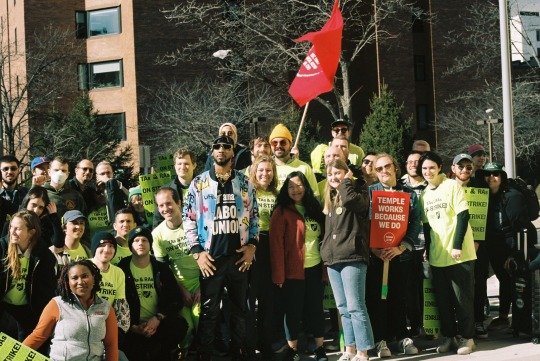
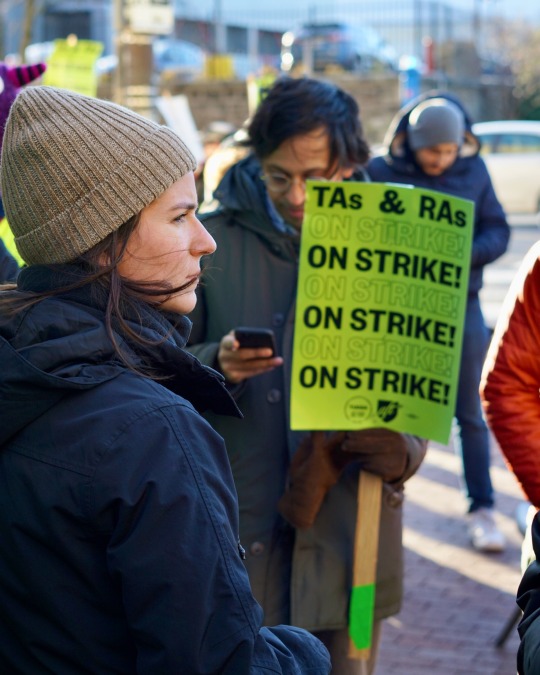


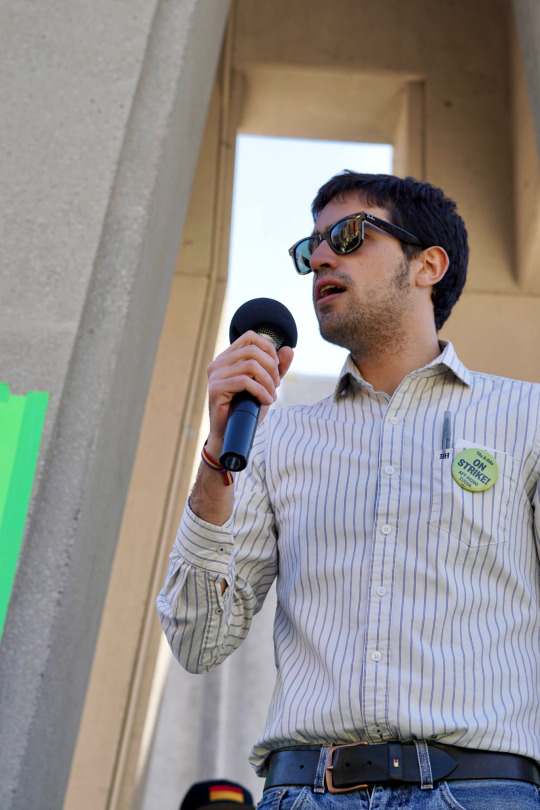

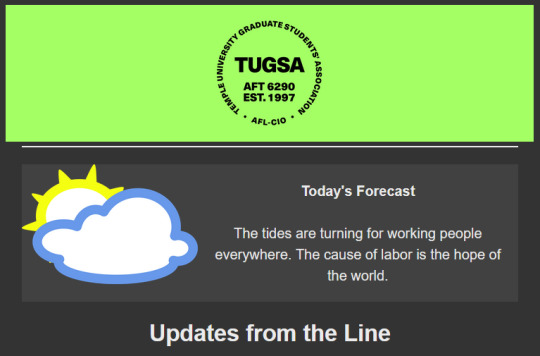
858 notes
·
View notes
Text
A few thoughts on the student protests for Palestine in the USA (and elsewhere) - I am seeing some leftists worrying that coverage of these protests will draw attention away from the genocide. Attention on news & social media is not zero-sum, and there's an increasing dearth of up-to-date info on Palestine as the average person's attention has waned. Western media is naturally inclined to devote more coverage to domestic issues, and taking up as much of this as possible with news related to the genocide can only be a good thing. Local protests against colleges or other organizations doing business with weapons manufacturers etc. also aids the larger story of international support, for which I've seen nothing but joy from Palestinian citizens and journalists.
The USA student protest movement is also a fertile place for building solidarity regarding other issues like labor and for future movements. More action = more experience = stronger coalitions. Many of the groups coordinating support for these protests were formed to fight local police brutality, queer discrimination, or union busting. The current protests are gathering greater attention because of the skills and relationships these groups already have in place. If these protests had zero effect on the universities divesting from Israeli companies, they'd still be useful for radicalizing and strengthening groups on campus and for sending a message of support to the people of Palestine.
Anyway, the central question has always been "what should Americans be doing to support Palestinians & end the genocide?" And I think students leveraging their positions to sever relationships between their universities and the groups causing the genocide is a great step in addition to all the other work being done: protesting the USA government, divesting from Israeli + American weapons manufacturers (like Elbit & Lockheed Martin) and the American businesses working with them (Google & Amazon have a lucrative cloud computing contract with Israel, Microsoft works with their Ministry of Defense), donating eSims so Gazans have internet access, etc etc
Lastly, the making fun of the protestors for being privileged or how they react to being brutalized (e.g. yelling about being a professor)? You know this is not useful. C'mon guys. We share a common goal.
115 notes
·
View notes
Note
(If you're alrght with another poorly articulated question from an obnoxious high schooler) Do you have thoughts on academics and their position in a labor framework? I know some grad students and have never been quite sure where they fit because they don't always work with "capital" in a traditional sense. Professors are odd to me because they are under university contract, but rather than get paid by the university they often get their own funding from the government. Or graduate sudents, who are often unionized, but I know a paleontology student who studies shark fossils who says he doesnt really consider what he does "making surplus value."
ok well that last person is simply confused lol. graduate students exist because the university profits from having us; it is a capitalist institution. most directly we usually work as teaching assistants or research assistants (or else pay tuition) and more indirectly, graduate programs get funding and university support because their existence contributes to a university's rankings, prestige factor, &c, which is to say its (perceived) profitability. plenty of us study things that don't produce much directly lucrative research, but this does not mean the university keeps us around for shits and giggles or some kind of laudatory interest in knowledge for its own sake. it is a capitalist institution and acts in the financial interest of its owners / beneficiaries.
anyway wrt faculty members, they are also employed by the university because it profits from them (or hopes to, anyway). i think many people get confused by tenureship; tenure is indeed fairly cushy as far as employment contracts go, but it is is still an employment contract, and most faculty are not actually tenured anyway. academics are a classic example of the 'professional-managerial class', which is not a marxian term but is a useful one for identifying those 'upper-middle class' members differentiated by their professional qualifications and status; the prestige and perceived utility of academic knowledge production is partially what makes academics an attractive target for a lot of government and NGO funding. state funding of academic research ofc has numerous functions but, and not to put too fine a point on it, a capitalist state also invests money in things because it is hoping for some kind of return on investment, eg in the form of directly profitable inventions, soft power, &c.
there are distinctions here between different academic employment statuses. an adjunct or contingent hire is paid by the university solely to teach, making their labourer status fairly straightforward. with tenured or tenure-track positions, yes there may also be money coming from outside; however, this doesn't negate the fact that the university is trying to profit from its faculty (else it wouldn't hire them). the professional-managerial class has certain characteristics of both proletariat and bourgeoisie, and there is some variation between academics as a very select few do attain the kind of household name status that can turn them into basically a personal brand. again though: the university wants to extract value from the work (both teaching and research) of academics it hires, and so do outside sources of funding for research projects. knowledge production should not be mystified or abstracted in ways that obfuscate the financial interests of involved parties; though it attains a prestige that few other commodities do, this is still a process that is embedded within the overall operating logics of capitalism.
an additional consideration wrt internal academic class politics is that many faculty use graduate students, postdocs, and even undergrads to perform or assist with their research. these arrangements vary in structure (and between disciplines) but in general, this does mean that many academics produce papers, books, &c that depend upon the labour of many people and rarely compensate these people equally to themselves. this can take the form of a more overtly employer-employee relationship between a professor and their underlings (for example, some labs are run this way) or it can be the case that it's another party (a publisher, say) who is reaping most of the surplus value squeezed from grad / undergrad / postdoc labour. in any case it is important to keep in mind that professors can and often do take on employer (ie, small capitalist) roles in relation to other employees of the university, even though the professors themselves are there because the university and other institutions pay them and profit from their labour.
i hope this is a useful start; obviously there is lots else to be said about the economics of the university and knowledge production as a capitalist process. in general when you are trying to think through this my advice would be not to let the presentation of the university as some kind of cerebral place of enlightenment confuse a materialist analysis of the flows of capital. plenty of workers and capitalists deal with commodities that are immaterial in the sense that 'knowledge' is, or are imbued with similar social meaning and value; the university deals with knowledge production but this does not make it any less an employer (ie, a capitalist institution) than any other institution operating in a capitalist context.
#unionisation is another thing rly---university union politics are kind of atrocious generally lmfao#v rare to find solidarity between academics---even grad students---and other employees of the university like support staff or athletes#ofc many grad students consider themselves not employees but temporarily embarassed PMC. so#academia
133 notes
·
View notes
Text
good evening! my girlfriend is raising funds to urgently evacuate dr. abdul rahman al-ashqar to egypt from gaza. before october 7th, abdul was training as a surgeon in al-shifa hospital, which was stormed by israeli forces. the surgical building was bombed. abdul is now a refugee in north gaza, displaced from the very hospital where he once worked, a hospital where mass graves upon mass graves have been uncovered. every day that abdul stays in gaza is a day his life is in jeopardy. any amount helps.
this fundraiser is directly vetted—dr. al-ashqar studied medicine in palestine with samar, a palestinian friend of erica's from high school who is co-coordinating the fundraising. every dollar raised here will be transferred via western union and go towards the $5000 USD needed for his safe passage into egypt, with additional funds used for housing, food, and survival in egypt. please message me with any questions you have and please, please share widely!
#frankly not sure what to tag this as so it gets reach but doesn't get shadowbanned/nerfed#so if you have suggestions please lmk 💓
65 notes
·
View notes
Text
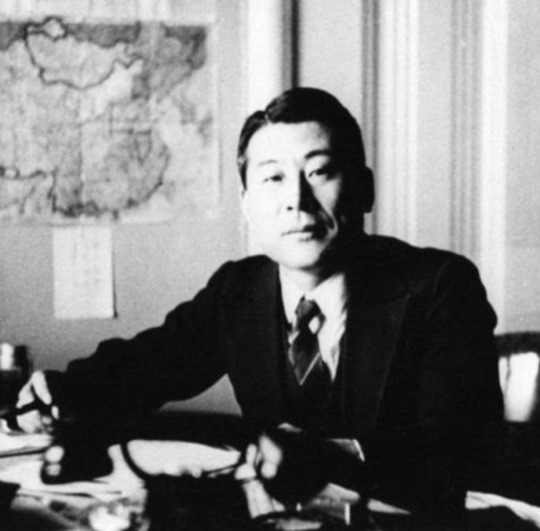
Chiune Sugihara was a Japanese diplomat in Lithuania who put his family and career at risk by issuing thousands of hand-written transit visas to Jewish refugees fleeing Eastern Europe.
Chiune was born to a middle class family in Mino, Japan on the first day of the 20th century – 1/1/00. In elementary and high school he was a top student, and his father wanted him to become a doctor. Chiune’s own dream was to enter the foreign service, and he deliberately failed the medical school entrance exam by writing only his name on the test. Instead Chiune attended Waseda University and majored in English. He also joined a Christian fraternity to practice his English.
In 1919, Chiune passed the Foreign Ministry Scholarship exam, and served in the Japanese Imperial Army as a 2nd Lieutenant stationed in Korea. He resigned his commission in 1922 and trained for the Foreign Ministry, learning Russian and German in addition to English. He aced the qualifying exam and was sent to work in the foreign office in Harbin, China.
Chiune’s strong moral compass led him to resign his post as Deputy Foreign Minister in Manchuria because of rising Japanese violence against the Chinese (just two years later was the horrific Rape of Nanking by the Japanese Imperial Army.) Chiune returned to Japan, where he married Yukiko Kikuchi. They later had four sons.
Next Chiune went to Helsinki, Finland, where he worked as a translator for the Japanese delegation. In 1939, Chiune became vice-consul of the Japanese embassy in Kauna, Lithuania. Part of his job was to find out if Germany planned to attack the Soviet Union, and to relay any information about this to his bosses in Berlin and Tokyo.
In 1940, the Soviet Union occupied Lithuania. At that time, approximately 1/3 of Lithuanians were Jewish, many of them Torah scholars. The USSR viciously persecuted Jews, especially religious ones, and the Jews of Lithuania were desperate to escape the country – especially because Nazi Germany was occupying more and more of Eastern Europe and would soon be in Lithuania. Hundreds of them, mostly Orthodox, visited the Japanese consulate to beg for exit visas to Japan. The official Japanese policy was that candidates for visas must go through elaborate bureaucratic procedures and pay significant sums of money. Chiune contacted his superiors at the Japanese Foreign minister to ask if the rules could be relaxed to help Jewish refugees. His request was denied, as were his next two requests.
Chiune could have thrown up his hands and told the Jews there was nothing he could do for them, but instead, as he did in China, he was governed by his strong sense of right and wrong, rather than soulless bureaucrats. He ignored his orders and started issuing ten-day visas for Jews to travel through Japan on their way to safe havens like Shanghai, China, where 20,000 Jews rode out the war safely.
As word got out about the Japanese visas, Jews from all over Lithuania as well as Poland began to swarm Chiune’s office. He simply wouldn’t say no to anybody, and spent 18-20 hours a day (!) painstakingly writing visas by hand. He created a month’s supply of visas every single day from August to early September 1940, providing an escape route for thousands of Jews. On September 4, the Japanese consulate in Kauna was closed and Chiune had to leave the country. He was determined to create as many transit visas as possible, and continued doing so up until the last minute. At Kanuas Railway Station, a crowd of Jews gathered to say goodbye. Right before boarding the train, Chiune bowed deeply and cried out, “Please forgive me! I cannot write anymore. I wish you the best!” Someone in the crowd shouted, “Sugihara! We’ll never forget you! I’ll surely see you again!”
Chiune was reassigned to East Prussia, then Prague, and then Bucharest, Romania. When the Soviet Union occupied Lithuania in 1944, Chiune and his family were imprisoned in a POW camp for a year and a half. Finally they were released in 1946 and returned to Japan, but the foreign office had heard about his unauthorized visas, and he was forced to resign. At about this time, the Sugihara’s youngest son died of leukemia at age seven.
Unemployable in Japan, Chiune made use of his excellent Russian language skills and spent the next 16 years working in the Soviet Union while his wife and sons stayed in Japan. Chiune’s exceptional heroism was unknown for many years, until 1968, when he was contacted by Yehoshua Nishri, an attache working at the Israeli consulate in Tokyo. Nishri spent his youth in Poland, and heard stories of the legendary Japanese hero. Nishri made it his mission to publicize Chiune’s heroic acts, and the next year, 1969, Chiune traveled to Israel as an honored guest of the Israeli government. Jews he’d saved lobbied for him to be recognized as Righteous Among the Nations by Israeli Holocaust Memorial Yad Vashem, and in 1984 he received the honor. At that time he was too sick to travel, so his wife and son Nobuki accepted the award on his behalf.
Chiune was asked why he risked everything to help thousands of strangers. He answered, “You want to know about my motivation, don’t you? Well. It is the kind of sentiments anyone would have when he actually sees refugees face to face, begging with tears in their eyes. He just cannot help but sympathize with them. Among the refugees were the elderly and women. They were so desperate that they went so far as to kiss my shoes. Yes, I actually witnessed such scenes with my own eyes. Also, I felt at that time, that the Japanese government did not have any uniform opinion in Tokyo. Some Japanese military leaders were just scared because of the pressure from the Nazis; while other officials in the Home Ministry were simply ambivalent. People in Tokyo were not united. I felt it silly to deal with them. So, I made up my mind not to wait for their reply. I knew that somebody would surely complain about me in the future. But, I myself thought this would be the right thing to do. There is nothing wrong in saving many people’s lives… The spirit of humanity, philanthropy… neighborly friendship… with this spirit, I ventured to do what I did, confronting this most difficult situation – and because of this reason, I went ahead with redoubled courage.”
Chiune Sugihara died in Japan on July 31, 1986. Despite being a hero in Israel, and among Jews worldwide, he was completely unknown in his own country. Even his own children didn’t know what he had done. A huge delegation from around the world attended Chiune’s funeral, and only then did he become known in Japan.
Chiune received many awards and accolades, most of them posthumous. Among them are Sugihara Streets in Vilna, Lithuania, and Jaffa and Netanya in Israel. There is a Sugihara House Museum in Kaunas, and a park in Vilna where 200 trees were planted on his 100th birthday. There is a life-sized statue of him in Little Tokyo in Los Angeles, featuring a plaque with a quotation from the Talmud, “He who saves one life, saves an entire world.” In 1998, Chiune’s widow Yukiko traveled to Israel and was warmly received by survivors who’d been saved by her husband. There is a Sugihara park in Jerusalem, and he was featured on an Israeli postage stamp in 1998. The Lithuanian government declared 2020 “The Year of Chiune Sugihara.” He has been the subject of multiple works of art, including books, films and a play.
It’s estimated that over 100,000 people are alive today because of the brave actions of Chiune Sugihara.
108 notes
·
View notes
Text
lib cope is insane
President Biden and Vice President Kamala Harris have quite deliberately rejected the economic ideology that concentrated wealth among the 1%. On their watch, the federal government has worked to put money into the hands of ordinary Americans rather than the very wealthy. With Democrats and on occasion a few Republicans, they have passed legislation to support families, dedicate resources to making sure people with student debt are receiving the correct terms of their loans (thus relieving significant numbers of Americans), and invested in manufacturing, infrastructure, and addressing climate change. They have also supported unions and returned to an older definition of antitrust law, suing Microsoft, Amazon, and Apple and allowing the federal government to negotiate with pharmaceutical companies over drug prices.
IMO the antitrust stuff, however feeble, is good, but the rest of this is pure make believe bullshit.
Millions of people were lifted out of poverty under Trump due to emergency anti-covid legislation, and then they were plunged right back into poverty again when Biden failed to extend any of that legislation. Rent is out of control. Food prices are out of control. Climate change is out of control. The "support" unions got was for Biden to step in and crush the railroad workers' strike and their big reward for his interference was to get one additional personal day, which I think brings it up to two per year. Thanks, Uncle Joe.
41 notes
·
View notes
Text

And today's the mini event for the next big event!
Today we know what's their background is, so here we go!


The Leadership of the Student Union
Minerva Academy Student Union is an organization established by the academy. Through the careful management of each student union, it has now become an indispensable bridge and leader between the academy and students. In addition to the leadership team with the president and vice president as the core, there are also a number of functional departments responsible for different matters such as publicity, literature and art, and sports.
Among them, the Publicity Department has performed particularly well, and has been awarded the title of Excellent Department many times recently. The Publicity Department is responsible for daily tasks such as printing school newspapers and posting posters. It's not only records major activities of the college, but also records the energetic mental outlook of students. It is an indispensable student organization.


Minerva Academy Drama Club
Minerva Academy focuses on cultivating students' interests and hobbies. Minerva Academy has opened many clubs of different directions and types. The drama club is one of the most outstanding clubs among the many clubs. It has many members and with students that are good at acting, dancing, scripting, directing, etc.
The drama club has their own classroom. The space in the classroom covers the rehearsal space and prop storage space. It is also equipped with professional video recording and playback equipment. In addition, the school has also specially approved drama club students to use the school auditorium and other venues for rehearsals during specific times, so that students can better understand and learn drama-related content.


Overseas Exchange Program
In order to promote academic exchanges between on-campus students and classmates from overseas institutions, improve students' comprehensive quality, and stimulate students' innovative learning motivation, Minerva Academy has established an overseas exchange program. Every year, the academy will select a number of students to go overseas for cooperation. In addition to exchange studies between schools, overseas academy will also send students to this city to study with students from Minerva Academy.
Since overseas student representatives came to the city for inspection and decided to make Minerva Academy a key partner for the exchange program, the program has been implemented for many years, with a total of 43 students participating. Hoping the friendship between the two schools will last forever and the exchanges will last forever.


Strong artistic atmosphere
Under the concept of diversified development of Minerva Academy, the art lovers who gathered together continued to communicate and collaborate with each other, forming a strong artistic atmosphere in a corner of the campus.
The building is included with a fully equipped art classroom. The commonly used drawing board paints, plaster models, etc., the art classroom also prepares art book sections of different styles for students to refer to when creating. In addition to hosting club activities for students in the art club, the art classroom is also open to students outside the club during non-club time. Students who are interested are welcome to visit and experience and step into the door of the art world.
#translation#cn spoilers#tears of themis#cn server#tot cn spoilers#artem wing#vyn richter#luke pearce#marius von hagen#tot new event
30 notes
·
View notes
Text
Welcome Back to the Collection of Athens Writes
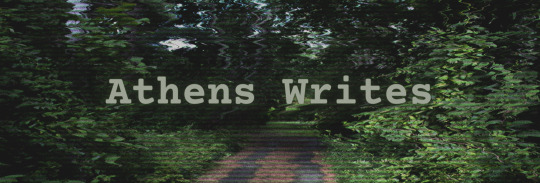
Hi! I'm Athens/Andy (they/them). I am a somewhat old yet somewhat new face on writeblr. I'm currently a second year student at a university in the deep south, studying history and anthropology in order to become a museum curator. Most of my free time is spent writing, which is the driving force behind this blog. Writing has become the love of my life over the past ten years.
AthensWrites has had two prior iterations. All I posted here in the previous iteration was privated, including Not Your Typical Fairytale. Don't fear, NYTF will make a glorious return ;)
With all that said, welcome back to the odd writings of Athens, and I hope you enjoy your stay. Below the cut, I've detailed some of my current projects, which range from Sci-Fi (my favorite) to thrillers to fantasy to realistic fiction. I've highlighted key content warnings and tags for each, just to keep you aware. If you'd like to hop on a tag list for any of these stories, please let me know! Some of them I post more frequently than others. I am also very tag list and tag game friendly so PLEASE tag me in stuff. If you need other people to tag in a writeblr tag game, look no further than this post!
The collection is constantly updating and evolving, so stay tuned!
Not Your Typical Fairytale (#nytf)
Although originally planned as a standalone novel, NYTF has now expanded into three separate books: Knight of Dawn, Queen of Noon, and King of Dusk. There's an additional collection of short stories/untold stories planned as well, tentatively titled Pawn of Midnight.
Content warning: gore, death, violence, graphic scientific experimentation, derealization, paranoia, drug use and abuse, alcohol use, child abuse (physical, verbal), relationship abuse (verbal, manipulation), sex (consensual)
Related tags: nytf, Piers Hall, Grady Yensey, Rene Dubois, ATLZoS
Knight of Dawn
Piers Hall is the newly crowned monarch of the post-apocalyptic State of Georgia, after their mother, Queen Adele, was declared unfit to rule. Despite meaning well, they find themself unprepared for the role, especially as political rivals, like North Carolina’s President René Dubois and Councilmember Shanna Miles, close in on their tail, seemingly threatening to topple their rule.
When various palace staff start to show where their real loyalties, it seems like Grady Yensey, Commander of the Royal Guard and their closest friend, is the only one they can trust. Piers and Grady must scramble to uncover the truth behind Queen Adele’s questionable associates, Piers’ missing past, and President Dubois’ shady activities
International Alliance of Superhumans (#iash)
Superhumans have existed as long as we have, normal people who suddenly develop seemingly magical powers overnight. That’s why the International Alliance of Superhumans was founded in 1945, to help control these superhumans to better humanity. Now, the Alliance's ideals and control is falling apart, as the Underground and the Union threaten its weakening rule over the superhuman community.
Fireball is the golden hero of the Alliance , the face of the organization, the beloved apprentice of the Chief Administrator after the death of the one and only GoldenSon. He’s brave, courageous, kind, and always up to take a photo with the kiddos, accompanied by his partner, NightSong. He’s taken down villains from Quantum Rift (the killer of GoldenSon) to Árbol Terror, and now has his eyes set on taking down Hueso Blanco and Morpheus Nox before they can tear a hole in reality.
Brigid Roberts is the face behind the mask of Fireball. They’re the only child of the now-deceased Nikki Roberts and find have found themself seeking revenge for Nikki’s death…while also trying to manage this superhero business and their senior year of high school. It doesn’t help that the administration of Wesmoreland keeps threatening to expel them for their aggressive behavior.
Hueso Blanco is the epitome of an ex-Alliance villain, a well beloved hero fallen from grace, after Árbol Terror and Quantum Rift convinced him to join the Underground. Now with both of his former allies dead, he leads the Underground, and with the help of Morpheus Nox (an up and coming villain with a terrifying similarity to Quantum Rift) he plans to tear a hole in our reality, ripping out world apart.
Martin Garcia-Flores is the sole caretaker of his younger brother, Elias, and would do anything to protect him. After the Alliance's violent threats, he left, in order to protect what was left. He lost friends and family and his love to the Alliance's corrupted side, and now works tirelessly to bring it to his knees…while also trying to work three separate jobs to keep himself and Elias afloat.
When fate brings Brigid and Martin face to face, maskless and vulnerable, the two come to understand they may not be as different as they’d both previously thought.
Content Warning: violence, gore, death, family abuse (physical, verbal), alcohol (use)
Related Tags: IASH, superhumans, Brigid Roberts, Martin GF, Hueso Blanco, Fireball
Space Clue/The Murder of Fredrik Lexand (#tmfl)
In 2183, humans abandoned earth as her ecosystems collapsed and became uninhabitable. Now, the remnants of humanity live in the Lexand Starfleet, a group of 16 name-brand ships, sailing towards deep space. In control of it all is Fredrik Lexand, the 17th great grandson of the original founder of Lexand StarFleet. From his living pod at the head of StarSeeker Alpha, he controls everything and anything that happens to humanity, from their food to their spouses to where the remnants of humanity will travel to. The weight of the world on one man’s shoulders (who are we kidding, of course he has lackeys who do all the menial work), worshipped as a god.
Until the morning he is found brutally dismembered, mangled parts of his body strewn all over his office. Humanity freezes, watching intently, as the Lexand Pod is locked down by Detective Scoud Tambry, swearing to uncover the killer, and avenge the Corporate god-king.
Content Warning: Violence, gore
Related Tags: tmfl, space clue, Triple A Siblings, Scoud Tambry
Something Queer is Afoot (#SQIA)
Something Queer is Afoot is a massive collection of stories, all centering around queer life and romance. The Queer Crew is the group which most of them are centered around. This collection is MASSIVE and has about 10 different novella-length stories within. The content warnings listed below covers ALL of SQIA.
Content Warnings: su*cide, death, homophobia, transphobia, abuse (physical, verbal, and sexual), drug use and abuse, religious trauma, sex (consensual and noncon/r*pe)
Related Tags: SQIA, tqc, nlth, frf, sunandgun, boc
Still to be added: All of SQIA's individual projects, Cryto Conspiracy, The Great Fantasy American Road Trip, World of Ateine, Neon Squad
MORE TO BE ADDED SOON, SO STAY TUNED!
Athens' Current Objectives....
Blog Tag Directory:
#athenswrites: Personal writing
#athens answers: ask games
#other writeblrs: exactly what it sounds like, other writers I've reblogged
#writers I love: reblogs of close friends or writing that just hits me different
#rblg: general reblog tag
I'm pretty good at tagging extensively, so if you need to find something or are looking for a specific wip in my blog, there's a high probability I've tagged it like crazy
#writeblr#writing#writeblr intro#writeblr community#boost#new writeblr boost#nytf#scifi#fantasy#iash#superheroes#creative writing#writerscommunity#writer#lgbtq
119 notes
·
View notes
Text
University Workers on Strike.
Hi there!
TLDR: My union has called for a strike, starting Monday, Nov 14.
I am not an official representative of the union but these are my personal thoughts, and my reasons for striking, with links to our official UAW platform.
Graduate students, postdocs, and other academic student employees are essential to the teaching and research mission of the University of California, especially as undergraduate enrollments rise. But as greater and greater demands are placed on our work as researchers and educators, we are falling into rent burden and poverty, and suffer unjust treatment by our employers.
We cannot provide the level of research and quality of education that WE WANT to offer our colleagues and our students in these conditions.
Therefore we are demanding:
Wages and raises that meet or beat inflation.
Making the University-owned housing AFFORDABLE.
Increasing access too and affordability of sustainable transit options for commuters
Enshrining protections for workers against bullying and harassment from their supervisors
Among other demands, which can be found here.
What can you do to help?
Undergraduates at the University of California can help us out! Check out @ undergradsforCOLA on Instagram
Community members can donate to the Strike Pay Fund. As we strike, the university is allowed to withhold our pay for work we are refusing to perform. The Union provides a small stipend to striking workers who are actively supporting the picket line (as I will be).
Keep up on social media and amplify the voices of our union (Santa Barbara’s is included here but there are others, and I do not attend the SB campus personally)
Write to (YOUR PERSONAL) representatives in the California Legislature, as well as the leadership of the University of California, in support of the strike and our demands.
IF YOU DONT LIVE IN CALIFORNIA: In addition to donating and amplifying the movement on social media, look at universities in your state. They’re looking at us right now. Many academic workers have unionized, following our example, over the past YEAR. This is a young movement that will live or die in the near future... and your support--even if it’s just encouragement--can give it power! Contact the local unions for workers like me and voice your support. Contact University administration and local political leaders to encourage them to support academic workers’ rights and compensation. And when academic workers go on strike, show your support with donations, vocal encouragement, and even volunteer on the picket line.
Please reblog this! Talk to people about it.
Below the cut, some more personal explanations.
Some of you may know that I am a graduate student, or more accurately, I am “pursuing my PhD in chemistry.” There is nothing “student” about my situation. I do not take classes. Instead, I perform highly trained laboratory work for the University of California along with countless other Postdoctoral scholars, technicians, and so on. Though the word research might conjure just pictures of me, a scientist in a lab, there is invaluable work being done in Humanities and Social Sciences that take on many different shapes and forms. All of it is done under the auspice of the University of California, and it is THIS that gives the university its prestige worldwide.
When I receive my “degree” I will continue doing the same work I am doing--currently on a $30k stipend--but the jobs I will be looking at pay $90k or much, much higher.
As a researcher, the work I do is severely underpaid in this university setting. It is something that we all DO agree to and put up with for the sake of having this “apprenticeship” time with prestigious professors and older researchers, at institutions that have technology, equipment, and libraries we need for our work.
HOWEVER, in agreeing to this severely underpaid work, we are offered things like guaranteed housing in the local community--communities like Berkely, Santa Cruz, Santa Barbara, Irvine, and San Diego, that are INCREDIBLY EXPENSIVE for people to live in otherwise. Or...some of us are guaranteed. Because EVEN in the University-owned housing, there are:
housing shortages
lack of significant subsidies
rent burden
More than 37% of my income goes to rent every month, and I live in the cheapest possible apartment from University-owned housing. Many academic workers are not even OFFERED the cheaper options, instead being given the “take it, or lose your housing guarantee on campus and fend for yourself in the outer community” treatment...but their offers are for apartments that cost 55% of their income or more. The university is paying us. The university is also charging us through the nose for housing we desperately need and can neither find nor afford elsewhere.
In addition to the insane rent burden we undertake, there are inadequate legal protections from overworking us (our reputations and references entirely depend on our advisors and supervisors Approving, and many of them expect 7am-midnight-or-late work days, 7 days a week), bullying us, harassing us or otherwise abusing us. International workers--drawn here, again, by the prestige of the University’s research efforts--are most at risk, and most unprotected.
There are other issues of equality and fairness at stake here: child support and paid leave, affordable transportation (hey, if we can’t afford to live in Santa Barbara, we will need to commute from somewhere else. Right now there are few options that are affordable, let alone sustainable, to do so), just to name a few examples.
The University also claims to be a leader in labor equality, fairness, and movements. We are among the historical faces of the Free Speech Movement and Vietnam War protests. We are the faces of labor rights research and progressive policy development and sustainable energy research. We are where the Earth Day movement started!
AND YET the University has antagonized union-forming efforts, incentivized anti-union sentiment, threatened and implied retribution for union activities, spends insane amounts of money trying to quash the union and send counter messaging, and seems to want to do ANYTHING other than pay us well.
Here’s an example of one of the latest offers and how insulting it is.
And it’s not just us. Food service workers on campus, custodians, and many others on campus who make things RUN, have gone on strike in the past and showed us how utterly hypocritical our sterling, utopic University is.
It’s just a corporation.
And so we are treating it like one, by going on strike.
I love what I do. I love science, and the research I do is focused on issues related to our energy crisis. The training I’ve received has prepared me to take jobs with IMPACT, that will shape our green energy future.
And I am a passionate educator. Right now I am responsible for ~ 250 students (a portion of our 900 students taking Chem1A right now), with classrooms of 50 students each. These are not ideal teaching conditions and yet I am DEDICATED to using the best pedagogy I have learned to help our most at-risk students succeed in this class. I have a history as a TA of improving student outcomes for underrepresented minority, low-income, and first-generation students who disproportionately fail our classes due to poor preparation at their local high schools, feelings of alienation, and the likelihood that they are working multiple jobs through college while more privileged students focus on classes. I have shown that I care about my students, in ways that even many professors do not.
That is why it is a heartbreaking and infuriating decision to go on strike, but I believe there is no alternative way to make the University improve our situation. We do it for other UC workers who are not compensated as well as we are, and we do it for future graduate student researchers, TAs, and postdocs–some of whom we hope are in Chem 1A right now--and we do it for the students who are not being best-served by graduate students sleeping out of cars, forgoing meals, and suffering from abusive supervisors.
Thank you for your support in whatever form it takes. it has been really encouraging to have friends, family (my REPUBLICAN CONSERVATIVE FAMILY SUPPORTS THE STRIKE), students, strangers, and even my supervisor (again, a red Ohio man lol) supporting this exercise of our legal right to protest, and the demands we are standing behind.
Talking to my advisor was a terrifying ordeal, especially when the other members of my lab were too scared to do it and risk his ire. We have a good relationship with him, but the fact is that he is our supervisor, and his reputation depends on our hours worked, and he could be frustrated. But I couldn’t sleep well if I didn’t participate in this strike, so I resolved to sit in front of my advisor face-to-face, alone, and tell him I was joining the strike.
My advisor isn’t the problem, the structure of the university is. But it was still the most terrifying conversation I’ve ever prepared for. And it went...so well. So, so well.
Our faculty understand that we are under a worse rent burden than they have ever seen or experienced themselves (they weren’t, and aren’t, paid super well either!), and they understand that we care about our work and don’t WANT to stop.
So it’s with great relief, and fervent hope, that I will be joining the strike. I hope whoever is reading this feels INVIGORATED by this movement, no matter the outcome. We are a new generation that is saying enough is enough. We will not tolerate mistreatment. We will work together to make sure we are all uplifted.
My department treats its chem students better than MAYBE any other chem department at the UC. We have it REALLY GOOD. My primary reason for striking is:
Sure. I can put up with some things. It’ll be tight, but I can afford it. Barely.
But I know many, many others can’t. They are my friends and colleagues. They were my mentors in the past. They are who I might be in the future!
Doing it for them is right.
473 notes
·
View notes
Text
"On 6 May 1933, the Berlin chapter of the German Student Union made an organised attack on Magnus Hirschfeld's Institut für Sexualwissenschaft (roughly: Institute of Sex Research).
The institute's library included many thousands of volumes on sexuality and other matters relating to its work. The institute also had a substantial collection of objects, photographs and documents including research, biographies and patient records."
[Source, emphasis mine]
"The institute pioneered research and treatment for various matters regarding gender and sexuality, including gay, transgender, and intersex topics. In addition, it offered various other services to the general public: this included treatment for alcoholism, gynecological examinations, marital and sex counseling, treatment for venereal diseases, and access to contraceptive treatment. It offered education on many of these matters to both health professionals and laypersons."
[Source]
Never forget.
Never let this happen again.
#may 6#remember#gender and sexuality#transgender#intersex#gay#lesbian#lgbtqia#lgbtq community#for those wondering#this is what a certain author denied#so i decided to post a reminder on the day it happened
27 notes
·
View notes